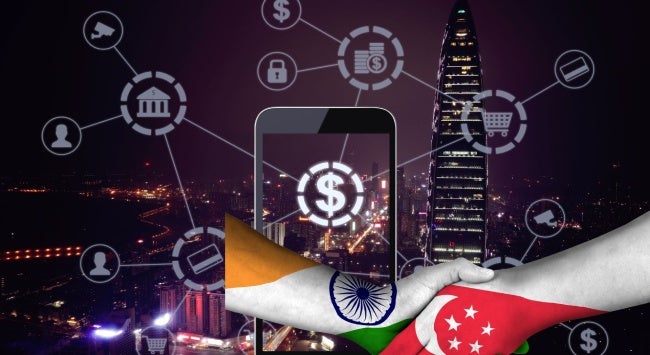Expanding the India-Singapore FinTech Wave
Karthik Nachiappan, Mriganika Singh Tanwar
20 November 2025Summary
Cooperation in financial technology (FinTech) is crucial between India and Singapore. The former brings extensive reach, digital infrastructure and skilled professionals, while the latter offers sophisticated regulation, global financial connections and investment capital setting a solid foundation to deepen FinTech strides.
Financial technology (FinTech) has transformed India and Singapore’s financial sector by integrating digital technology into financial activities and services. This technology has revolutionised and accelerated financial engagement through activities like payments, savings, lending, investment and insurance. India and Singapore are ideal partners in building a trusted, inclusive and innovation-driven fintech corridor across Asia. With political will, regulatory alignment and strategic investment, this partnership can shape the future of digital finance in the Indo-Pacific.
India
India is recognised as a global leader in financial technological innovations. India’s digital landscape was transformed in 2016 with the introduction of the Unified Payments Interface (UPI). Developed by the National Payments Corporation of India under the Ministry of Electronics and Information Technology, UPI is a digital payment system that consolidates multiple bank accounts into a single mobile application. It combines various banking features, streamlines fund transfers and enables cashless merchant payments. UPI has seen exponential growth, processing 0.8 billion transactions in January 2018 and over 14.4 billion in July 2024, now handling over 80 per cent of India’s digital payments.
UPI’s success is attributed to three key factors: widespread internet penetration and affordable smartphones; banking integration through Jan Dhan accounts, Aadhaar; and mobile connectivity, and the linkage of UPI with the Aadhaar digital identity system. Linking UPI with Aadhaar provided a strong security framework for real-time transactions. UPI has been a critical driver of financial inclusion and gross domestic product growth, bringing over 300 million people and 50 million merchants into the formal financial system. In June 2020, the Reserve Bank of India (RBI) also established a Payment Infrastructure Development Fund to promote digital payments in smaller towns and rural areas. UPI has garnered international interest and has the potential to establish India as a leader in scalable and secure digital payment solutions.
Singapore
Singapore’s emergence as a FinTech hub in Asia is due to its strategic location and strong connectivity to Asian markets. A key development in Singapore’s FinTech ecosystem was the launch of PayNow in 2017. Supervised by the Monetary Authority of Singapore (MAS), PayNow enables instant, secure transfers using mobile numbers, an identity card/foreign identification number or a Unique Entity Number built on the Fast and Secure Transfers network for seamless interbank connectivity. PayNow’s rapid growth and widespread adoption demonstrate Singapore’s increasing reliance on digital payments. In 2020, total real-time transactions reached 138.38 million, a 48-per cent increase from 93.24 million in 2019. The value of these transactions also rose by 40 per cent from US$110 billion (S$143.8 billion) in 2019 to nearly US$154 billion (S$201.4 billion) in 2020. By 2025, real-time transaction volume is projected to reach nearly 393 million. These figures highlight Singapore’s goal of becoming a cashless society and the interoperability of its digital public infrastructure.
The government has supported FinTech growth with various policy instruments. MAS’ FinTech Regulatory Sandbox allows financial institutions and FinTech firms to test innovative financial products in a controlled environment with temporary exemptions from certain regulations. This encourages responsible risk-taking and rapid development. Singapore’s legal framework safeguards digital asset property rights and provides clear guidelines on corporate guarantees, ensuring investor protection and commercial certainty. These initiatives are strengthened by ongoing improvements in data privacy, cybersecurity, and anti-money laundering standards, ensuring innovation occurs within a secure regulatory framework.
India-Singapore FinTech Cooperation
India and Singapore can robustly deepen their FinTech cooperation, building on their strong existing foundations. This collaboration can manifest through regulatory innovation, digital payments, financial inclusion and the development of cross-border financial infrastructure. In 2023, India’s UPI was linked with Singapore’s PayNow system to facilitate real-time, low-cost cross-border transactions benefiting consumers, businesses, and migrant workers in both countries. However, the broader UPI mechanism needs to become more financially viable and competitive, as instant payment applications often operate at a loss due to minimal or no transaction charges, posing challenges for banks. This partnership has strengthened dialogue between MAS and RBI through FinTech working groups, regulatory sandboxes, and bilateral discussions. Moreover, India’s FinTech hubs, particularly Mumbai and Bengaluru, are connected with Singapore, creating synergies and opportunities for startups, financial institutions, and technology firms.
Bilateral cooperation can be expanded in several ways:
- Deepening Cross-Border Payments: There is greater potential to enhance cross-border payments and remittances by extending the UPI-PayNow model to include more Association of Southeast Asian Nations (ASEAN) currencies.
- Interoperable Digital Identity Frameworks: India’s Aadhaar-enabled digital stack and Singapore’s SingPass/MyInfo could serve as a model for interoperable, secure digital identity frameworks. These would allow citizens to complete various activities – from banking to payments and communication. Both countries could lead the movement towards trusted digital public infrastructures for FinTech.
- Green Finance and Investment: Singapore’s expertise in developing green finance frameworks can assist India’s need for climate finance. Singapore can serve as a regional hub for FinTech investors, directing capital to fulfill India’s massive market demand. Indian FinTech companies could use Singapore as a gateway to expand into the broader ASEAN digital market.
. . . . .
Dr Karthik Nachiappan is a Research Fellow at the Institute of South Asian Studies (ISAS), an autonomous research institute at the National University of Singapore (NUS). He can be contacted at isaskn@nus.edu.sg. Ms Mriganika Singh Tanwar is a Research Analyst at the same institute. She can be contacted at m.tanwar@nus.edu.sg. The authors bear full responsibility for the facts cited and opinions expressed in this paper.
Pic Credit: ISAS/Canva
-
 More From :
More From :
-
 Tags :
Tags :
-
 Download PDF
Download PDF



